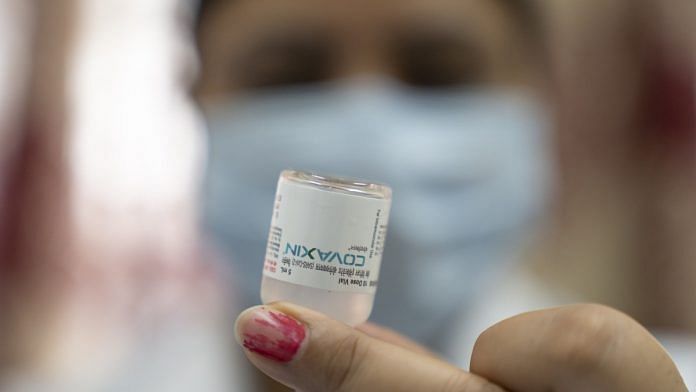New Delhi: While textiles, pharmaceuticals and electronics have been the focus of the atmanirbhar conversation following the Covid lockdown, the pandemic may have paved the way for a different kind of self-sufficiency.
As importing monkeys was not possible during the lockdown, indigenous rhesus monkeys (macaques) were used for the animal studies of Covaxin that were carried out during the lockdown with special permission from the Maharashtra forest department.
China, incidentally, is among the biggest suppliers in the world of research monkeys — both rhesus and cynomolgus monkeys. The latter are originally from Vietnam or Cambodia.
The experience of working with Indian monkeys, however, was not all rosy. In fact, when a paper on the Immunogenicity and protective efficacy of inactivated SARS-CoV-2 vaccine candidate BBV152 (that became Covaxin later) was submitted in the prestigious Nature Communications journal, animal rights groups wrote to the journal alleging mistreatment of the animals.
“We had to submit health certificates of every monkey used in the study before the paper could be published,” says Dr Samiran Panda, head of the department of epidemiology and communicable diseases, Indian Council of Medical Research, and one of the co-authors of the study.
The ideal candidates
There are stringent requirements for research animals. They should be healthy so that they can mount an immune response. They should not be too old and ideally inbred because that makes it easier to know their genome profiles. This is the reason why the import of monkeys is usually preferred though it is an expensive option.
But the Covaxin study was carried out at a time when flights had been stopped and importing monkeys was difficult. Any attempt would almost certainly have delayed the research at a time when the entire world was racing against time for the development of a vaccine. On top of that, China put a ban on exports of research monkeys early on in the pandemic.
The study used 20 animals; 30 were caught from the wild with permission from the Office of Principal Chief Conservator of Forests (PCCF), Maharashtra.
The ethics statement of the study says: “A decline in the macaque population was observed in the permitted areas of Maharashtra state, India, due to the habitat change of macaques probably imposed by food scarcity during the COVID-19 lockdown period of India (March 25, 2020 till May 31, 2020). Hence, twenty rhesus macaques (12 male and 8 female) were captured using experienced monkey catchers with the prior approval from PCCF, Maharashtra state, India. The approximate age of the animals was determined based on the dentition and body measurements. The research was conducted in compliance with the guidelines laid down by CPCSEA (Committee for the Purpose of Control and Supervision of Experiments on Animals), Government of India.”
Importance of simian studies in vaccine development
In a special issue of the Indian Journal of Medical Research published in March this year Dr Panda and several other ICMR scientists including director-general Dr Balram Bhargava commented on the importance of monkey studies in vaccine development.
“Pre-clinical trials of vaccines and other biologicals are important before embarking on clinical trials, as these may allow correct prediction of outcome in clinical trials. Rhesus macaques and Cynomolgus macaques are the two monkey species most frequently used for pre-clinical studies. There is genetic similarity between humans and Rhesus macaques, including sharing of pathogen genomes. It is also easy to handle rhesus monkeys, and therefore, they have been widely used in biomedical research. Cynomolgus monkeys bred exclusively for laboratory use are the most commonly used NHP models in pre-clinical trials these days, despite the unavailability of extensive genomic data for this species, unlike Rhesus monkeys….A recent pre-print study has shown that Rhesus and Cynomolgus monkeys are equally effective models for studying COVID-19,” they wrote.
China, the biggest market for research monkeys
China began the establishment of the rhesus (Macaca mulatta) captive-breeding program in 1978 and that of the cynomolgus (Macaca fascicularis, of Vietnam/Cambodia origin) in 1985 for scientific research.
The first export shipment of rhesus was in 1984 and cynomolgus in 1990, says a 2003 paper from the National Research Council (US) Institute for Laboratory Animal Research, Washington (DC). By 2019, China provided almost 60% of all research monkeys that were imported into the United States.
Monkey studies Dr Panda says have become rare in India over time but are important in the development of vaccines and therapeutics because prestigious journals often ask for data among non human primates. Studies in small animals and large animals also give different sets of data that are crucial to the development process.
“There are not many centres in India that can handle monkeys because it needs different levels of skill and dexterity. That is why most studies happen on rabbits, zebra fish and suckling mice. But small animal experiments are different from large animal experiments,” Dr Panda says. There are also concerns about religious and social beliefs and an unwillingness to get on the wrong side of animal rights activists that ICMR found out first hand with Covaxin.
(Edited by Paramita Ghosh)



